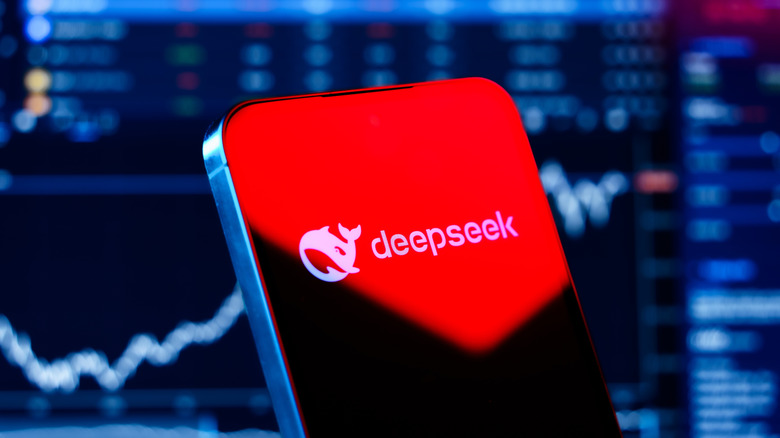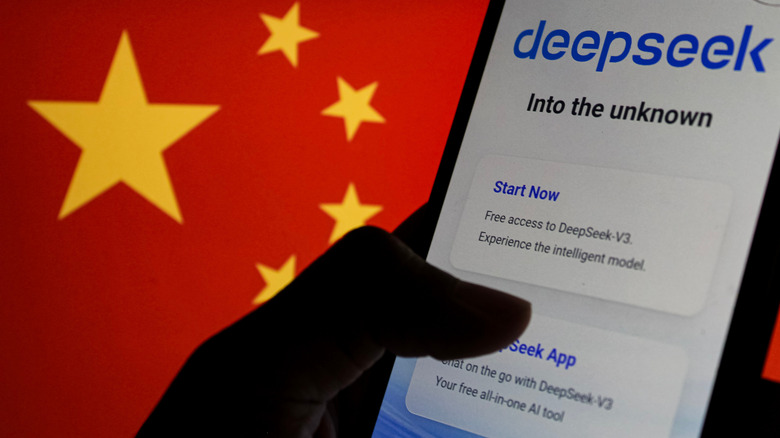These US States Have Outlawed DeepSeek, And More Bans May Be On The Way
Chinese firm DeepSeek sent shockwaves through the AI world when it debuted a large language model that could match the output of American platforms at a fraction of the cost and computing power. Upon its January 2025 release, DeepSeek quickly became popular. This success led to a wave of accusations by Western AI firms accusing DeepSeek of stealing critical data. Soon after, a greater security threat reared its head, as American legislators worried that the company gave the Chinese government and military access to sensitive user information. Then the U.S. DeepSeek AI bans began.
In its April 2025 report, Congress's Select Committee on the Chinese Communist Party found that "the app siphons data back to the People's Republic of China (PRC), creates security vulnerabilities for its users, and relies on a model that covertly censors and manipulates information pursuant to Chinese law" and was "built using stolen U.S. technology." As a result, several state governments moved to ban the platform from government computer networks. Thus far, at least 17 U.S. states have instituted some form of government ban on DeepSeek, including: Texas, New York, Virginia, Tennessee, Iowa, North Dakota, South Dakota, North Carolina, Nebraska, Arkansas, Oklahoma, Alabama, Kansas, Georgia, Pennsylvania, Oregon, and Nevada.
To date, no laws prohibit constituents or corporations from using DeepSeek on private computer networks. However, several federal and military bodies have also moved to squash the application's usage on government computers. Furthermore, it is important to note that the United States is far from the only country concerned about DeepSeek's privacy violations, as several European and Asian nations have also cracked down on the platform.
U.S. regulators take on DeepSeek
Concerns over DeepSeek's data protection policies harken back to Beijing's compulsory data-sharing laws, in which companies must grant the Chinese government and military unfettered access to all user data if requested. DeepSeek's own privacy policies do little to quell these questions, as the company states that it sends personal data like chatbot requests and uploaded files to servers in China.
As such, U.S. government entities have begun limiting employees' access to the platform to prevent the Chinese government from gaining access to sensitive government data. In January 2025, Texas became the first state to outlaw DeepSeek when Governor Greg Abbott ordered state agencies to block websites connected to the People's Republic of China. Many states soon followed, with Virginia, New York, Iowa, and others barring the AI platform from government networks. Some, like Tennessee and Alabama, extended the embargo to Alibaba's Manus AI platform, while South Dakota, Arkansas, and Georgia also placed social media websites RedNote and Lemon8 on their banned list, both of which are owned by TikTok's ByteDance. Pennsylvania's Treasury Department, meanwhile, also prohibited DeepSeek from its computer systems.
Several U.S. government bodies have followed suit. In January 2025, the Defense Information Systems Agency blocked the Pentagon's access to the chatbot after reports that employees used DeepSeek on Department of Defense devices. The Navy, meanwhile, barred service members from using DeepSeek "in any capacity," due to security and ethical concerns. That month, NASA's Chief AI officer released a memo to employees stating that the agency would ban the Chinese platform. The U.S. House and Senate have reportedly blocked members and staff from using the program on government devices, while the U.S. Commerce Department joined the fray in March 2025.
The global future
U.S. lawmakers continue to pursue DeepSeek bans. In February 2025, House members introduced the No DeepSeek on Government Devices Act to prevent federal employees from using the chatbot on government-owned devices. Other attempts at quelling DeepSeek's reach into the American market have come in the form of the Senate's Decoupling America's Artificial Intelligence Capabilities from China Act, which sought to ban U.S. investments, imports, and exports of AI-related technologies with China, and the House's China Technology Transfer Control Act, which looks to shift AI trade negotiations under presidential control. Thus far, none have passed into law.
These concerns are not unique to the U.S., as several nations look to restrict DeepSeek's access to sensitive data. In February, for instance, security concerns caused South Korea to strike the platform from app stores. The Czech Republic, Taiwan, and Australia have blocked the chatbot from all government devices. Meanwhile, Italy's data protection watchdog barred the chatbot nationwide over privacy concerns. This past summer, Germany pushed for Google and Apple to strike the chatbot from their app stores. Other European nations, including Ireland, the Netherlands, France, Croatia, Cyprus, Luxembourg, Portugal, and Greece, have also explored regulatory actions against DeepSeek.
Not every country has met DeepSeek with regulatory caution. In fact, the platform has been incredibly successful in Africa and Latin America, serving as both a springboard for regional AI developments and a geopolitical tool for China's economic and political entrenchment in the regions. As a whole, the debate over DeepSeek strikes at the core of a technological landscape in which the lines between personal privacy and foreign policy are increasingly blurred, necessitating that governments balance individual freedoms and national security interests.


